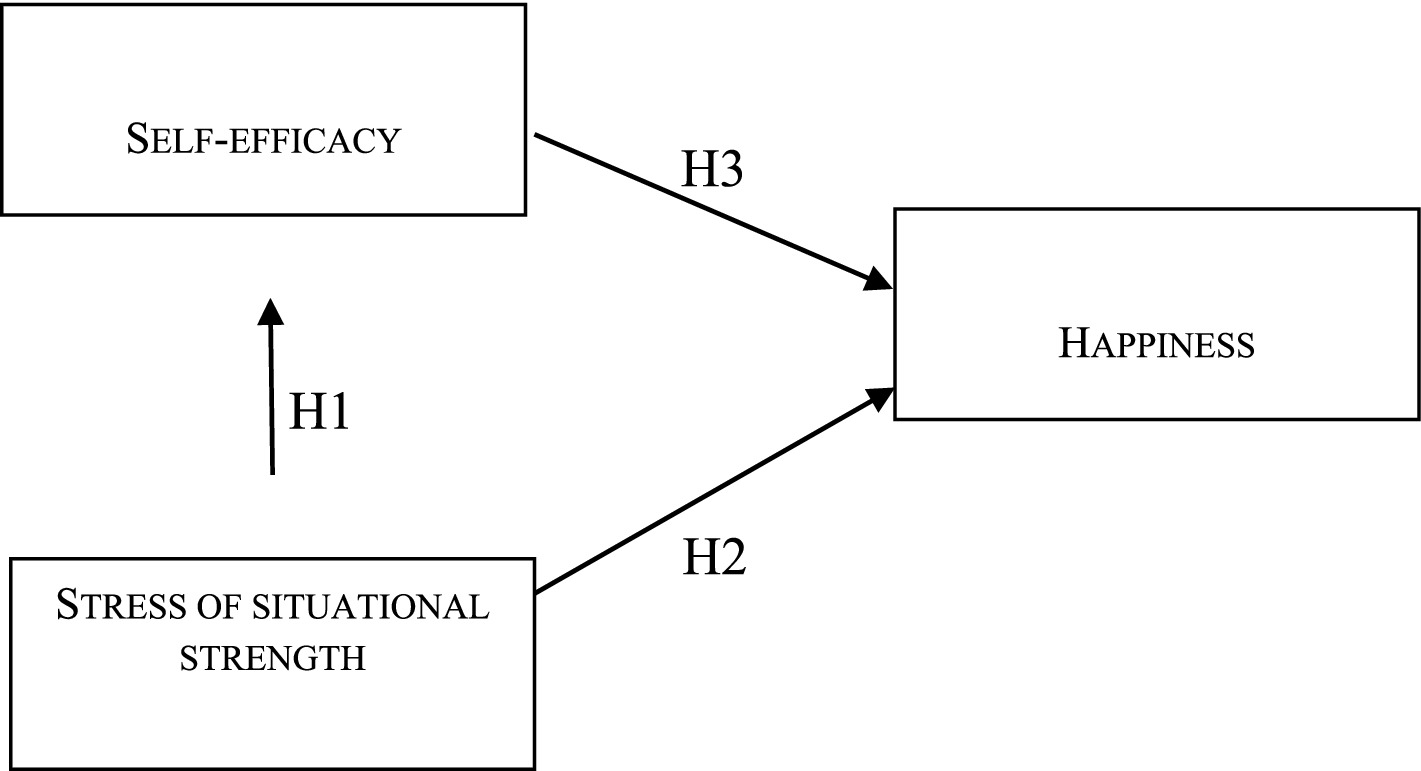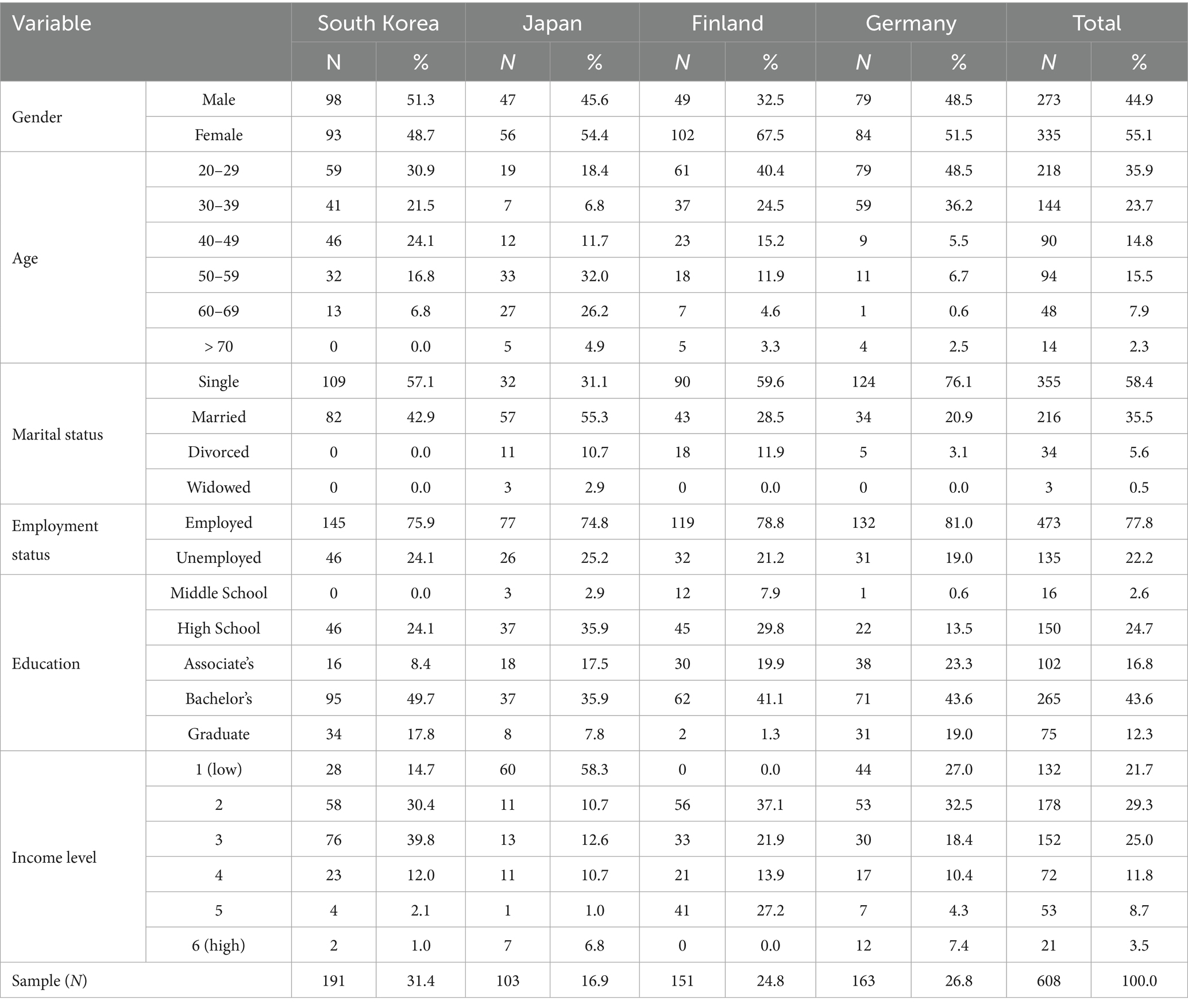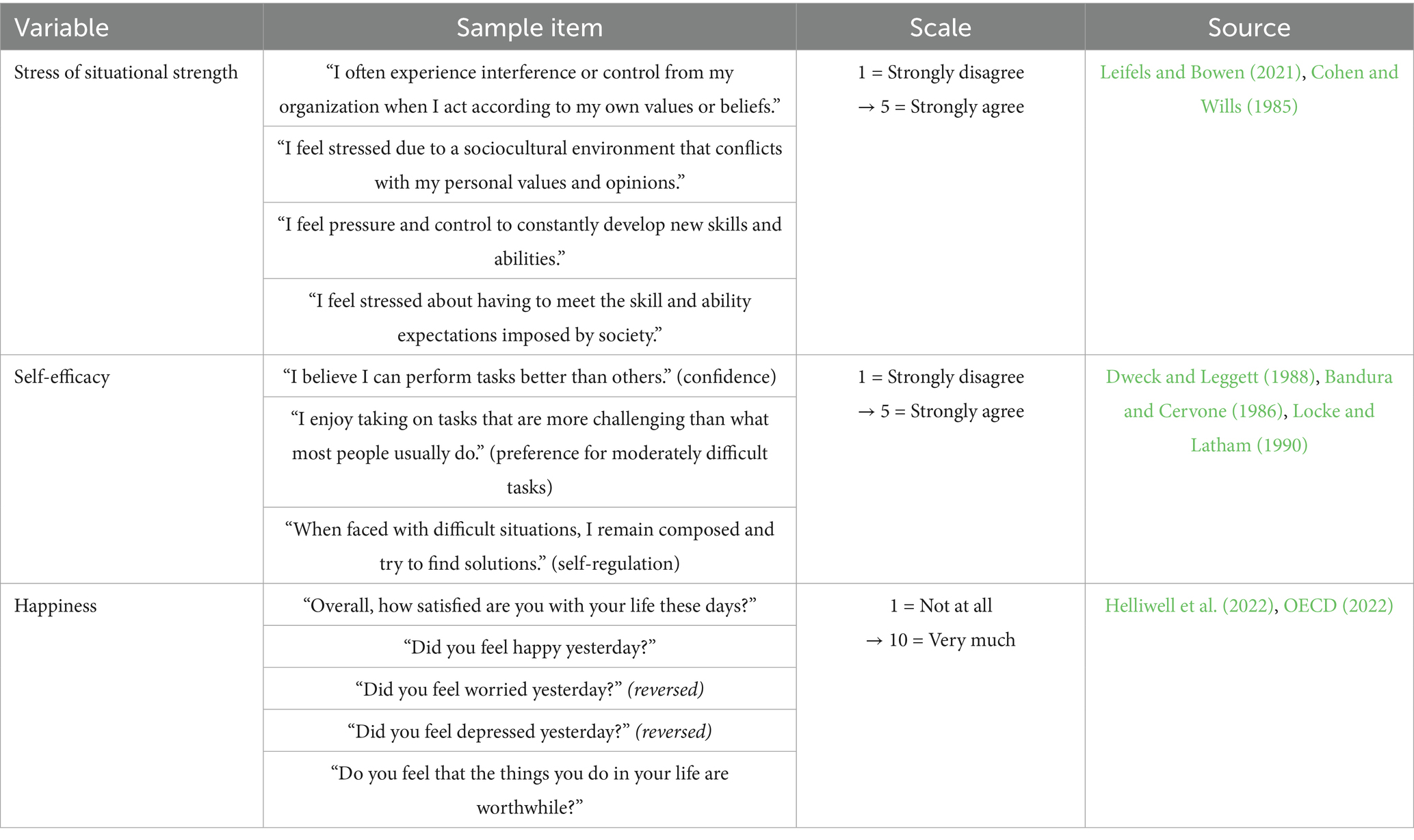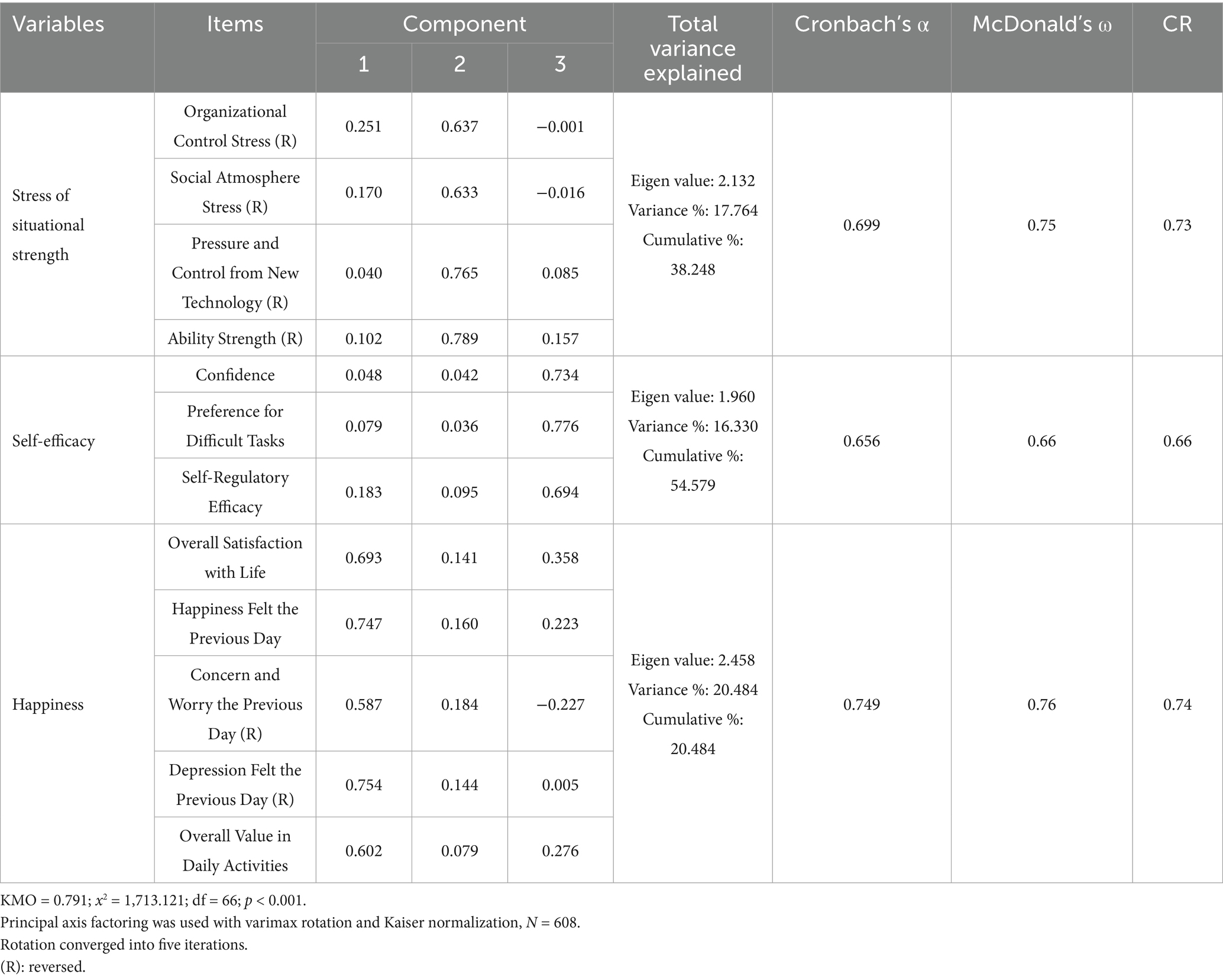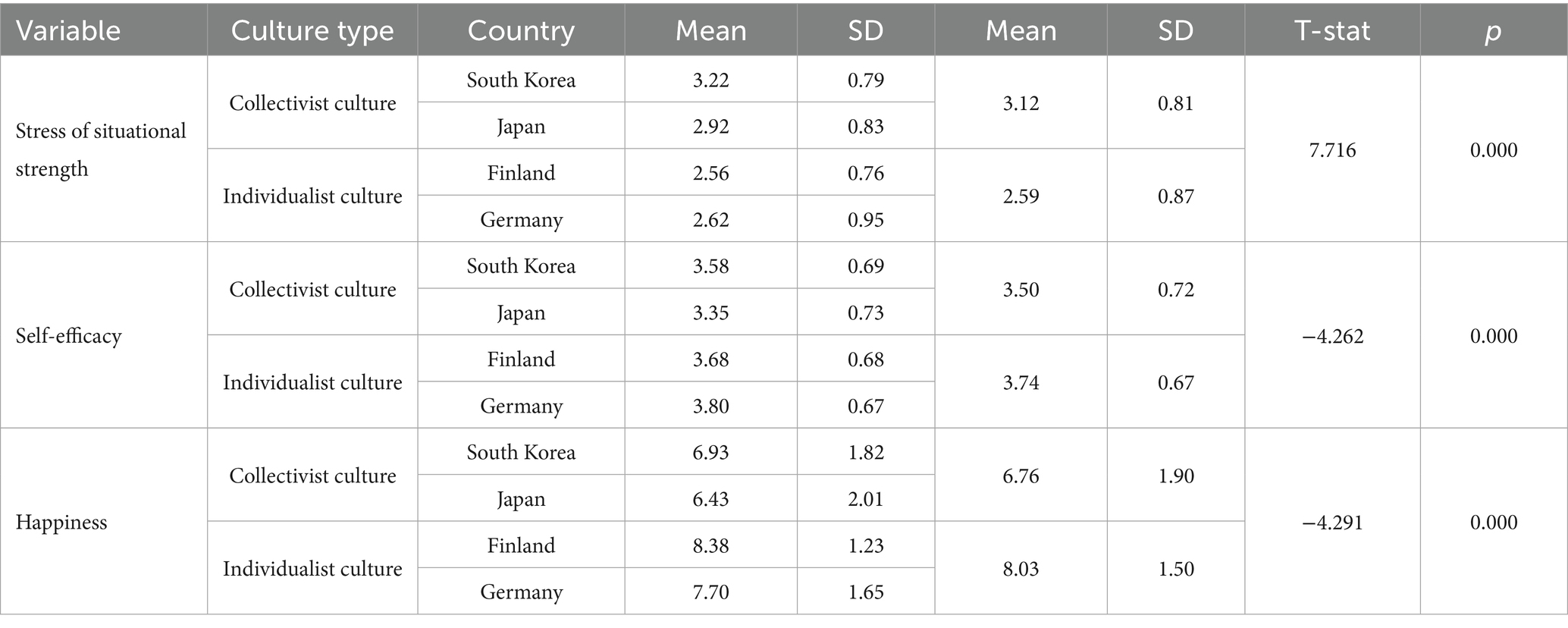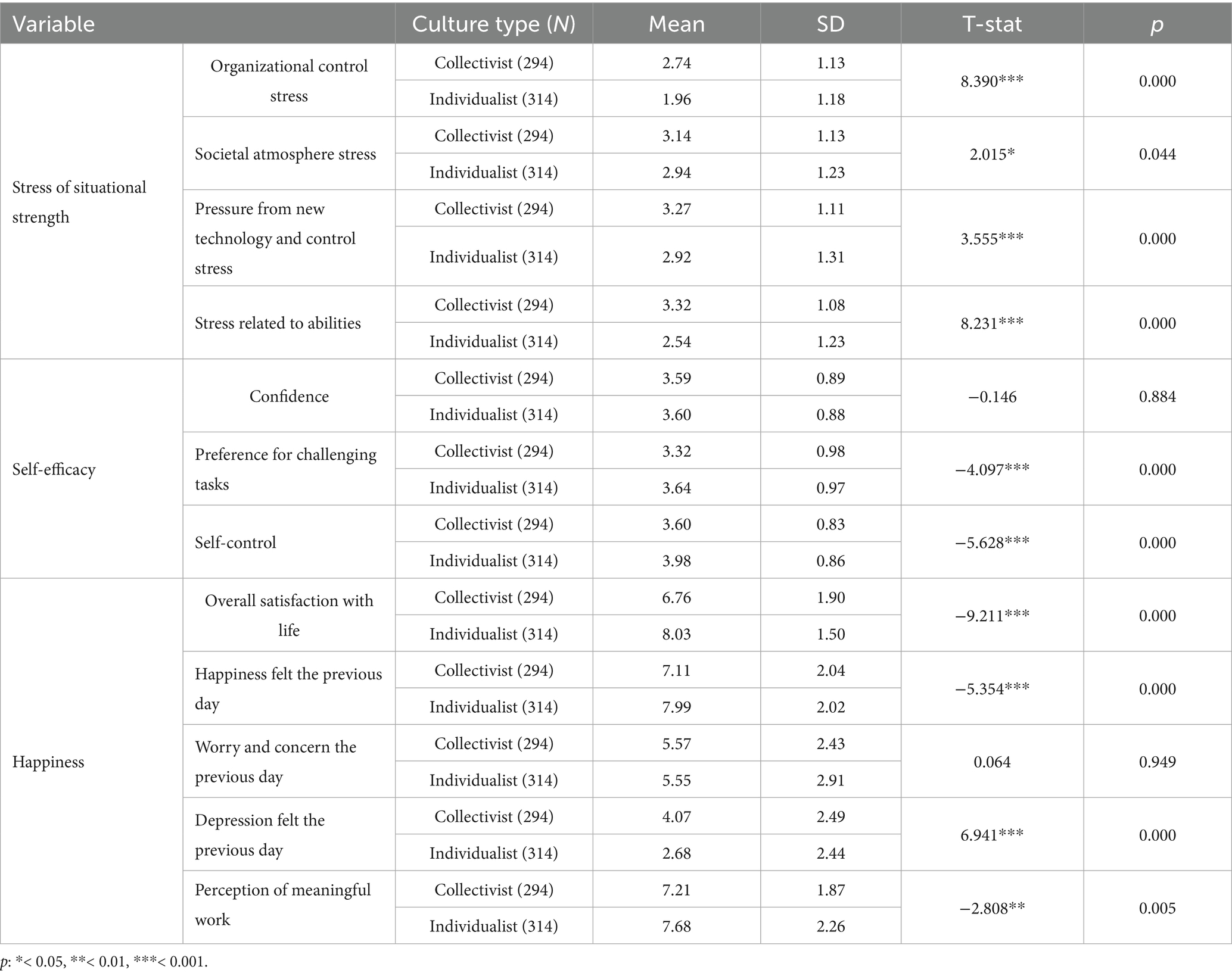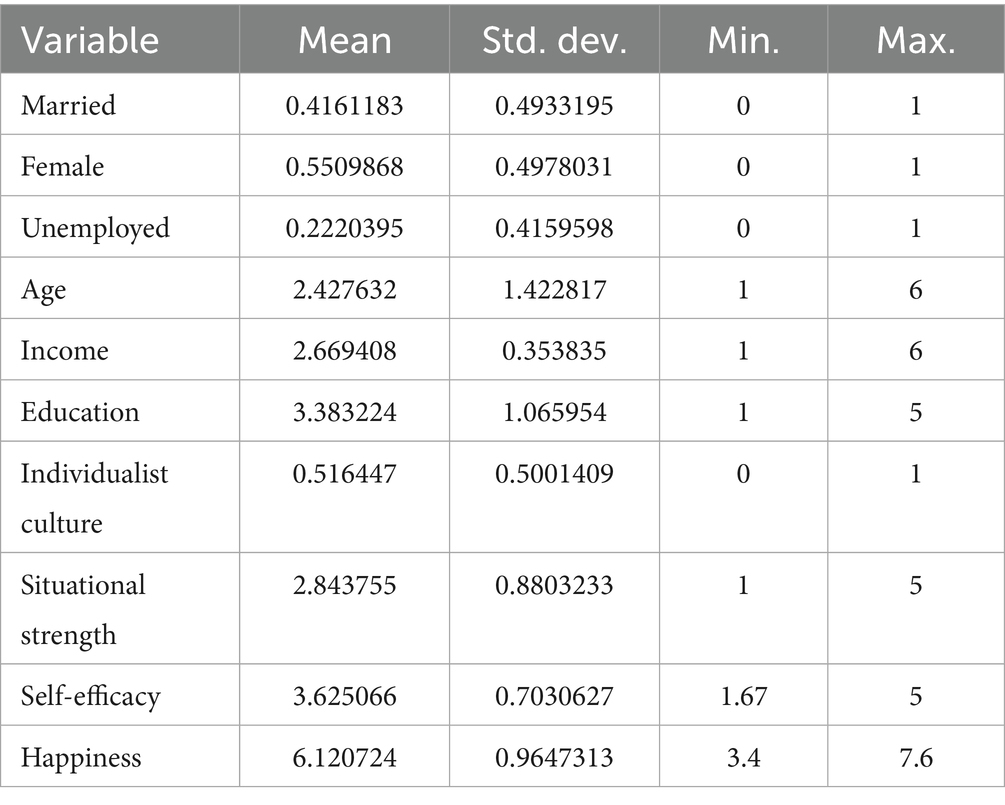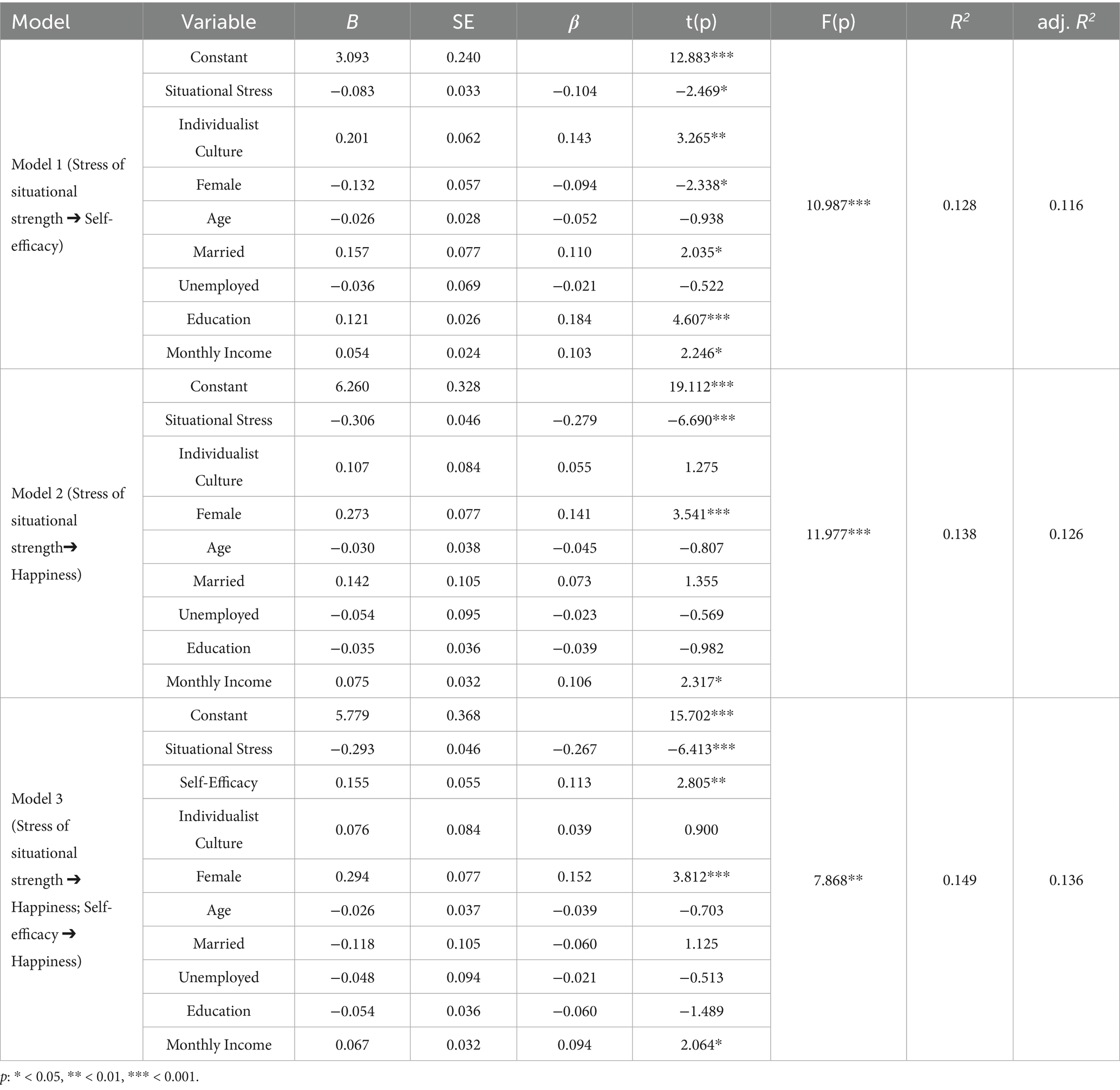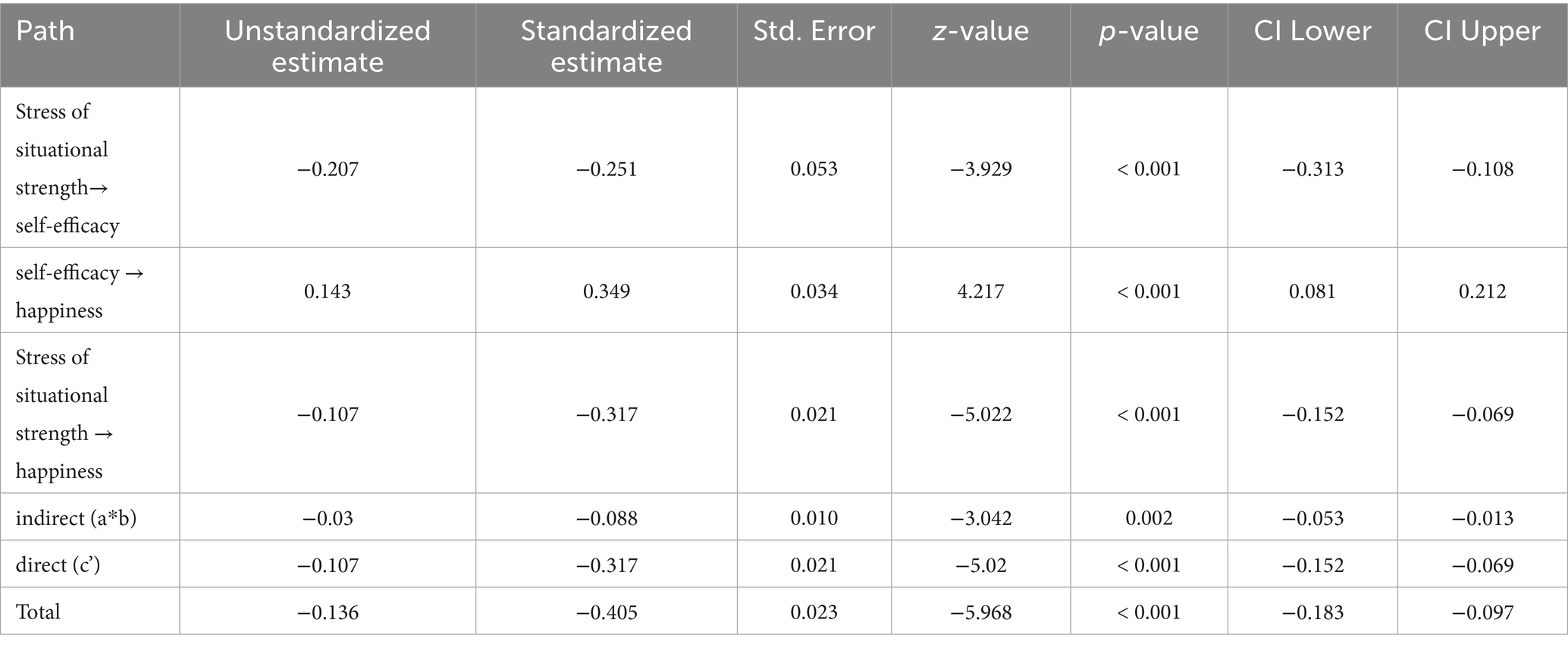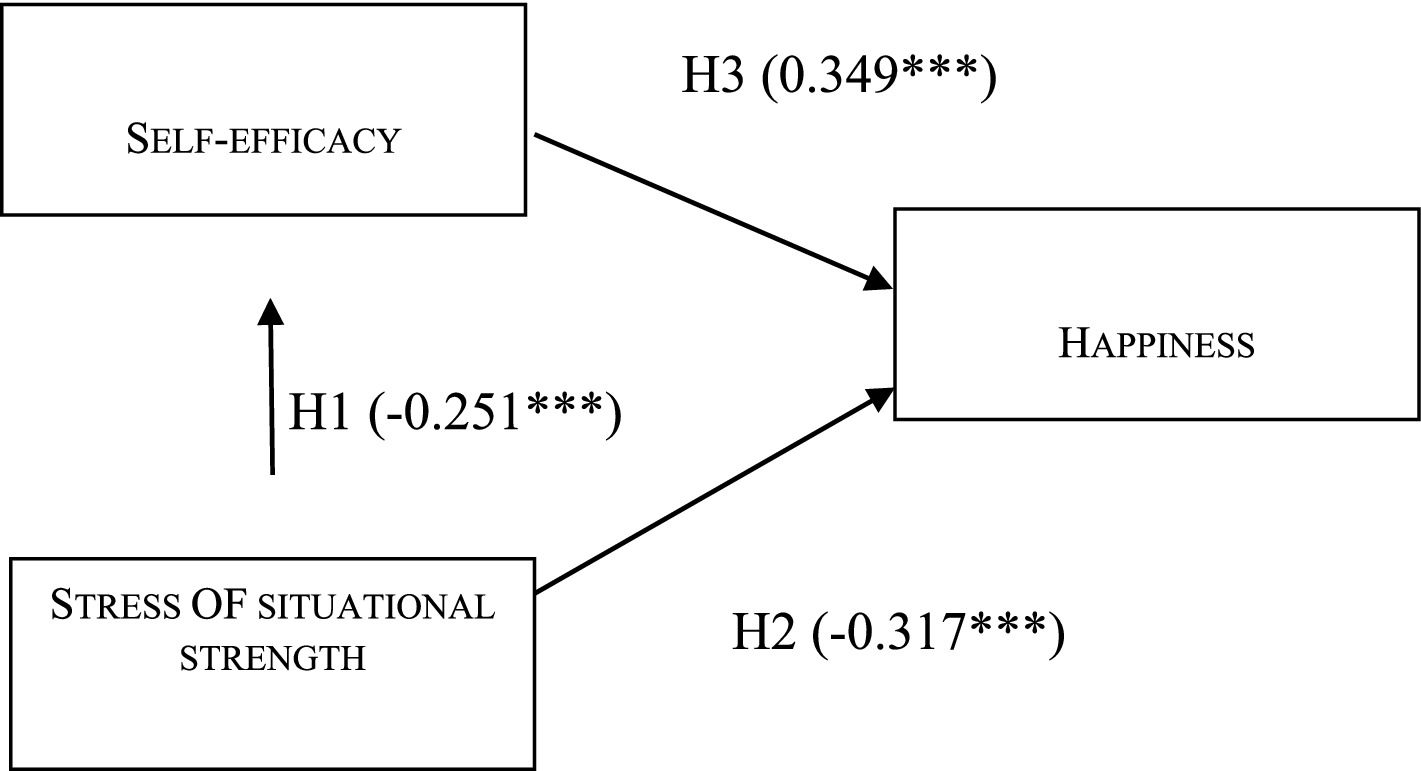- 1Department of Public Administration/Digital Contents, Sun Moon University, Asan, Republic of Korea
- 2National HUSS Consortium Center, Sun Moon University, Asan, Republic of Korea
- 3Askew School of Public Administration and Policy, College of Social Sciences and Public Policy, Florida State University, Tallahassee, FL, United States
When individual values, attitudes, and behaviors do not align with dominant cultural expectations, organizational societies often employ situational strength to promote behavioral conformity. While this may enhance organizational efficiency by minimizing variability in individual performance, it can also suppress self-expression and elevate stress—particularly for individuals in collectivist cultures who face stronger normative control. Notably, countries such as South Korea and Japan report lower average levels of happiness compared to Germany and Finland, despite comparable levels of economic development. This study investigates the psychological mechanisms underlying this disparity by examining the role of situational strength within cultural contexts. Using survey data from 608 participants across South Korea, Japan, Finland, and Germany, this study explores how perceptions of situational strength influence self-efficacy and happiness across different cultural orientations. The results indicate that situational strength significantly reduces both self-efficacy and happiness, with particularly strong effects in collectivist societies. Moreover, self-efficacy partially mediates the relationship between situational stress and happiness, highlighting its critical psychological function. Individuals in collectivist cultures experience higher levels of situational strength due to greater societal and organizational pressure to conform, whereas those in individualist cultures report higher autonomy, reduced stress, and greater psychological well-being. These findings advance situational strength theory by demonstrating that its effects on psychological outcomes are not culturally neutral. Rather, they are shaped by sociocultural environments that modulate the experience of conformity pressure. This study contributes to cross-cultural psychology by clarifying how cultural values and institutional norms interact to influence emotional and motivational outcomes.
1 Introduction
In any society, there is a mismatch between the whole and its parts. While societies pursue their unique cultures and values, organizations guide their members in alignment with their mission and vision. These organizations enforce explicit and implicit forms of normative control to ensure their members reflect shared values or behaviors. Ideally, when individuals naturally align their values and behaviors with societal norms, there is no conflict between the collective and its members. However, individual differences in values, abilities, and roles often lead to misalignment, resulting in varying levels of cohesion and disparity between the collective and the individual. In such cases, societies or organizations exert various tangible and intangible influences on individuals to promote harmony and achieve collective goals. These influences are called institutional forces or pressures and may be coercive, mimetic, or normative.
According to situational strength theory, environments with clear behavioral expectations and constraints can guide or restrict individual actions. In these situations, the influence of personal traits on behavior tends to diminish, and internal drivers such as self-efficacy may similarly lose their predictive power. When strong, situational strength can standardize individual behaviors by providing situational cues; when weak, behavior is more likely to be influenced by personality traits (Alam et al., 2025; OECD, 2024). The cultural characteristics of strong situations not only constrain self-expression (Gelfand et al., 2011) but also help moderate the relationship between individual differences and adaptive performance (Shoss et al., 2012).
Collectivism may inhibit or replace the formation of self-efficacy through culturally embedded social mechanisms (Meyer et al., 2010). Conversely, other research suggests that collectivism can interact with self-efficacy to enhance social or group efficacy. For example, Ajiboye and Olubela (2020) found that individuals with high self-efficacy are less prone to social loafing, while those with stronger collectivist orientations are more likely to avoid personal responsibility than assume collective accountability. These effects, however, vary across cultural contexts. In horizontal collectivist cultures—such as among East Asian youth—self-efficacy may operate in conjunction with communal responsibility to enhance social influence (Yu and Sun, 2024). These findings indicate that the relationship between collectivism and self-efficacy is not linear but contingent on cultural typologies and institutional environments.
While prior research on situational strength theory has largely emphasized its beneficial role in promoting organizational goals—by minimizing the influence of individual personality traits and standardizing job performance—there has been limited focus on its implications for personal happiness and self-efficacy. In collectivist societies, high-performing individuals may experience enhanced self-efficacy through social support. However, lower-performing individuals in such societies may suffer adverse psychological consequences that undermine both self-efficacy and happiness (Dalal et al., 2020). Cultural variations in the perception and interpretation of situational strength influence behavioral responses, situation-actor fit, and how individuals experience contextual cues. Traditional approaches to situational strength theory have centered on standardization and performance control, overlooking emotional dimensions such as self-efficacy and happiness. This study diverges from such perspectives by exploring how situational strength affects emotional outcomes, specifically self-efficacy and happiness.
The primary aim of this study is to investigate how cultural orientation—specifically individualism versus collectivism—influences the relationships among situational strength stress, self-efficacy, and happiness. Using data from four economically comparable nations (South Korea, Japan, Finland, and Germany), this study examines (a) the extent to which situational strength within organizational and societal contexts generates psychological stress, (b) how such stress affects self-efficacy and, subsequently, happiness, and (c) how these associations vary across cultures and individual-level socio-demographic. By identifying culturally contingent pathways, this research extends situational strength theory to encompass emotional and behavioral outcomes across diverse cultural settings.
This research contributes to situational strength theory by addressing cultural differences in individual behavioral responses—dimensions relatively overlooked in traditional approaches.
1.1 The present study
The selection of South Korea, Japan, Finland, and Germany was guided by their comparable levels of economic development despite substantial differences in quality of life and happiness. According to OECD data, these countries vary notably in demographic profiles, family structures, employment conditions, income inequality, and life satisfaction, despite similarities in education levels.
As of 2022, South Korea had 17.5% of its population aged 65+, a high tertiary education rate (69.3%), low unemployment (2.7%), and below-average life satisfaction (5.9). Japan, the oldest OECD society (29.4% aged 65+), had a 63.8% tertiary education rate and moderate life satisfaction (6.1), alongside low marriage and fertility rates. Finland, though reporting a relatively high unemployment rate (7.2%) and a moderate tertiary education rate (42.0%), ranked highest in life satisfaction (7.9), reflecting a liberal family culture with high rates of cohabitation and divorce. Germany had 22.0% aged 65+, a 32.4% tertiary education rate, and a life satisfaction score of 7.1. Its growing share of cohabiting and unmarried households aligns with multicultural and individualist trends.
This study investigates the impact of situational-strength-related stress on self-efficacy and individual happiness across four countries—South Korea, Japan, Finland, and Germany—that share similar levels of economic development. The research examines how individuals from diverse cultural backgrounds perceive and experience situational demands and how cultural differences influence the interpretation and psychological outcomes of those situations (Gardiner et al., 2020). Evaluating the appropriateness of situational strength within cultural contexts is essential for understanding individual cognition and behavior (Meyer et al., 2010). This study contributes to bridging a gap in situational strength theory by highlighting the importance of cross-cultural comparisons between cultural context and individual responses—an area that has received limited attention in prior research.
Based on previous research, we developed three hypotheses and the analytical model for this study (Figure 1):
H1: Stress arising from situational strength, designed to harmonize the collective and its components, influences individual self-efficacy.
H2: Stress stemming from strong situational strength impacts happiness.
H3: A decline in individual self-efficacy negatively affects happiness.
2 Theoretical background
2.1 Individualism and collectivism
Individualism and collectivism are essential concepts for understanding cultural differences (Heine et al., 2008; Hofstede, 1980a; Oyserman et al., 2002; Yamaguchi, 2001). These cultural dimensions are often examined in relation to socioeconomic structures (Greenfield, 2009; Inglehart and Baker, 2000) and lifestyle trends in modern societies (Talhelm et al., 2014). Hofstede (1980a: 148–170) described individualism as a cultural pattern prioritizing personal autonomy and independence, while collectivism emphasizes group harmony and interdependence. Triandis (1995) elaborated on this distinction, explaining that individualism focuses on self-reliance and individual rights, whereas collectivism values social cohesion and group harmony.
This study analyzes how situational strength and self-efficacy influence happiness among organizational members within both collectivist and individualist cultural contexts. South Korea and Japan are widely recognized as collectivist societies that emphasize group harmony, adherence to social norms, and relational identity. In contrast, Germany and Finland exemplify individualist cultures that value personal autonomy, self-expression, and independence. According to Gelfand et al. (2011), South Korea and Japan are considered “tight cultures,” characterized by strong social norms and low tolerance for deviance. Conversely, Germany and Finland represent “loose cultures,” which exhibit greater behavioral flexibility and a higher tolerance for nonconformity.
Hofstede (1997) argued that a nation’s wealth is generally positively correlated with its level of individualism. However, South Korea and Japan, despite being economically developed, maintain distinctly collectivist cultural patterns. This apparent deviation is largely attributed to the influence of Confucian heritage in East Asian societies, which emphasizes group values, social stability, and hierarchical order. Although Hofstede’s (1997) indices remain foundational, they reflect categorizations from nearly three decades ago. More recent frameworks, such as those proposed by Minkov and Kaasa (2022), offer updated indices derived from items in the World Values Survey (WVS). These updated models incorporate religiosity as a meaningful variable.
Building on Hofstede’s foundational model, Minkov and Kaasa (2022) proposed a revised individualism–collectivism (IDV-COLL) index, which incorporates religiosity as a key indicator. According to Minkov and Kaasa (2022), religious individuals often uphold fixed moral principles that guide behavior across contexts, which support a culture of behavioral consistency and ideological stability. Therefore, religiosity functions not merely as a belief system but as a cultural marker of inflexible self-concept and value preservation. Based on this updated framework, Germany (102) and Finland (88) are classified among the most individualist countries, whereas Japan (42) and South Korea (25) remain on the collectivist side of the cultural spectrum.
Minkov and Kaasa’s (2022) findings indicate a significant divergence from Hofstede’s earlier results concerning the United States (33), a discrepancy that may be attributed to the country’s unique religious landscape—particularly the collective orientation inherent in American Protestant traditions. Although the United States is commonly regarded as a prototypical liberal Western society, its IDV-COLL score suggests it does not occupy the extreme high end of the individualism spectrum, especially when compared to major East Asian countries.
The four countries examined in this study—Germany, Finland, Japan, and South Korea—were consistently found in both studies to be positioned along the individualism–collectivism spectrum in that order.
In collectivist cultures, when individual values and behaviors clash with societal or organizational norms, the pressure to conform is stronger than in individualist cultures. Collectivistic societies prioritize the collective over the individual, often exerting significant situational control to maintain cohesion. This control may heighten social tension, as individuals are expected to align their actions closely with group norms and suppress personal desires in favor of collective goals (Hofstede, 1980a; Kashima et al., 1995; Shweder and Bourne, 1982; Triandis, 1995; Triandis et al., 1988).
In organizations, the distinction between individualism and collectivism affects both the control exerted on members and the pressures they experience. Individualist cultures prioritize personal performance and accountability, often making individuals feel solely responsible for outcomes (Alvesson, 2002). Conversely, collectivist cultures emphasize teamwork and harmony, with organizational control relying on group consensus. When individual behaviors deviate from organizational norms in collectivist contexts, individuals face increased situational pressure and stress because conformity is critical (Alaybek et al., 2017; Cho and Park, 2013; Hofstede, 1980a, 1980b). A study by Gardiner et al. (2020) exploring the role of situational strength across different cultural systems suggested that it may have more impact on individual behavior within collectivist cultures (see also Harrington and Gelfand, 2014).
2.2 Stress of situational strength and self-efficacy
Situational strength theory (Mischel, 1977) posits that environmental cues and expectations constrain individual behavior by promoting norm adherence. Strong situations—characterized by clarity, consistency, constraints, and consequences (Meyer et al., 2010)—reduce behavioral variability and inhibit the expression of personal traits (Alaybek et al., 2017; Freudenstein et al., 2024; Yang et al., 2022).
The degree of situational strength is shaped by cultural context. Collectivist cultures tend to reinforce hierarchical authority, shared accountability, and collective decision-making, increasing external pressure on individuals to conform (Hofstede, 2001; Singelis, 1994). South Korea, for instance, exhibits persistent cultural rigidity despite its industrialization, combining strong societal norms with intense competition. This alignment fosters role overload and psychological strain when personal values or abilities diverge from societal or organizational expectations (Chen et al., 2016; French and Caplan, 1972; Karasek and Theorell, 1990).
At the organizational level, heightened situational strength may manifest as social isolation or workplace bullying, especially in cultures that emphasize conformity. Such dynamics stem from the mismatch between individual identity and collective expectations, where the pressure to align with rigid social norms increases stress and undermines self-efficacy (Björkqvist et al., 1994; Einarsen et al., 1994).
2.3 Self-efficacy
Self-efficacy refers to one’s belief in the ability to organize and execute actions to achieve specific outcomes (Bandura, 1977, 1997). It includes confidence, self-regulation, causal attribution, and a preference for moderately challenging tasks (Sherer and Adams, 1983; Bandura and Cervone, 1986; Locke and Latham, 1990; Zimmerman et al., 1992). These components shape how individuals cope with stress, persist in achieving goals, and regulate their emotions (Maddux, 2016; Schunk and Pajares, 2005).
In environments characterized by strong situational demands, perceived self-efficacy acts as a buffer, enabling individuals to maintain a sense of agency and emotional stability. Particularly in collectivist settings—where high levels of social cohesion and normative expectations prevail—self-efficacy plays a critical role in offsetting psychological stress (Pákozdy et al., 2024; van Zyl and Dhurup, 2018).
However, self-efficacy itself is culturally embedded. In collectivist societies, where organizational norms often override individual values, misalignment may diminish self-efficacy and, by extension, reduce happiness (Hofstede et al., 2010; Smith and Bond, 2019; Norris and Inglehart, 2019). This study aims to examine how self-efficacy mediates the relationship between situational strength and happiness across different cultural contexts.
2.4 Happiness
Happiness is defined as the subjective evaluation of life satisfaction, emotional well-being, and sense of purpose (Diener, 1984; Seligman, 2011). It encompasses both hedonic dimensions—such as the frequency of positive affect and the absence of negative affect—and eudaimonic dimensions, including optimism and flourishing (OECD, 2013; De Neve et al., 2013).
Rather than a fleeting emotional state, happiness is considered a comprehensive psychological indicator of life quality. It is shaped by both external structures and internal resources. Strong situational environments may erode perceived autonomy and control, thereby decreasing self-efficacy and elevating stress (Mischel, 1977; Bandura, 1997). Conversely, individuals with high self-efficacy are more likely to maintain positive affect and life satisfaction even under pressure (Schunk and Pajares, 2005; Kılıç et al., 2013).
Although numerous studies have independently examined self-efficacy and happiness, few have analyzed their interrelationship within the context of situational strength and cross-cultural variation. This study addresses that gap by exploring how situational demands and individual resources interact to influence happiness across distinct cultural settings.
3 Data and methods
3.1 Study design
This study examined how situational strength—conceptualized as perceived stress—affects happiness across four culturally distinct yet economically comparable countries: South Korea, Japan, Finland, and Germany. Data were collected over a two-year period (June 2022 to June 2024) using a mixed-mode approach. Approximately 80% of responses were gathered through in-person surveys during field visits, while the remaining 20% were collected online.
Survey implementation varied by country. In Germany and Finland, data collection was conducted in collaboration with OPIMKOTI, the Korea–Finland Education Research Center. In Japan, surveys were administered with support from a cultural anthropology professor at Soonchunhyang University, an alumnus of the University of Tokyo. In South Korea, a statistics professor from Sun Moon University advised on survey administration. Urban areas were selected as survey sites: Hamburg (Germany), Helsinki (Finland), Tokyo (Japan), and Seoul (South Korea).
To enhance cross-cultural comparability, validated items from prior international surveys were used, with particular attention to measures of situational strength, self-efficacy, and happiness. Happiness items were adapted from United Nations global well-being instruments. Survey instruments were translated by Korean professors residing in Germany, Japan, and Finland, and subsequently reviewed by local scholars to minimize misinterpretation due to linguistic or cultural nuances.
This study was supported by the National Research Foundation of Korea and complied with the Republic of Korea’s Personal Information Protection Act and the OECD Privacy Guidelines to ensure ethical data collection and participant confidentiality.
3.2 Participants and recruitment
Participants were recruited from local communities in each city with the support of academic collaborators. Recruitment was conducted through announcements shared via community organizations, universities, and local social networks. Participation was voluntary, and all respondents were informed of the study’s purpose and confidentiality procedures prior to completing the survey. To standardize responses related to organizational context, participants were instructed to consider their primary affiliation—such as their workplace, school, or volunteer group—when responding to relevant items.
A total of 628 responses were collected: 191 from South Korea, 103 from Japan, 183 from Germany, and 151 from Finland. After excluding cases with missing data, 608 valid responses (96.8%) were retained for analysis. Descriptive statistics for the final sample are presented in Table 1. A convenience sampling strategy was used, combining academic networks and community-based outreach coordinated by local partners.
3.3 Measures
Self-report measures were used to assess situational strength stress, self-efficacy, and happiness. All scales were drawn from validated international sources, adapted for cross-cultural use through forward–backward translation, and pre-tested for clarity. Each construct was operationalized as a composite score from multiple Likert-type items.
3.3.1 Situational strength stress
This construct was measured using four items adapted from stress and cultural norm studies (Cohen and Wills, 1985; Leifels and Bowen, 2021; Gelfand et al., 2011). Items assessed organizational control, normative pressure, skill demands, and value misalignment stress. Responses were rated on a 5-point Likert scale (1 = strongly disagree to 5 = strongly agree), and the mean score formed the composite index.
3.3.2 Self-efficacy
Three items were adapted from general self-efficacy and motivation research (Bandura and Cervone, 1986; Dweck and Leggett, 1988; Locke and Latham, 1990). Items assessed task confidence, persistence, and challenge preference. Responses were rated on a 5-point Likert scale, and the average formed the composite score.
3.3.3 Happiness
Five items, based on the UN World Happiness Report framework (Helliwell et al., 2022), assessed life satisfaction, daily happiness, anxiety and depression (reverse-coded), and life meaning. Responses were given on a 10-point scale (1 = not at all to 10 = very much), and the mean score represented overall happiness.
3.3.4 Cultural orientation
Countries were categorized using Gelfand et al. (2011) and Minkov and Kaasa (2022). South Korea and Japan were classified as collectivist-tight cultures; Germany and Finland as individualist-loose. This typology provided a theoretical basis for cross-cultural comparison (Table 2).
To ensure the validity and reliability of the measurement instruments across cultures, both exploratory factor analysis (EFA) and multi-group confirmatory factor analysis (MGCFA) were conducted. Table 3 shows the measurement reliability and validity of the constructs used in the study. As shown in Table 3, all factor loadings exceeded 0.65, indicating acceptable construct validity. Internal consistency was also adequate for exploratory research, particularly given the conceptual breadth of the constructs and the cultural diversity of the sample (Taber, 2018; Schmitt, 1996).
Measurement invariance was assessed using MGCFA. The configural model demonstrated acceptable fit (χ2 (204) = 407.55, RMSEA = 0.081, CFI = 0.857). Partial scalar invariance was supported, with the final model showing modest but acceptable fit indices (CFI = 0.711, RMSEA = 0.104). Although the CFI value was below conventional thresholds, partial invariance permits valid latent mean comparisons when at least two items—one anchor item and one additional invariant item—are consistent across groups (Jang et al., 2017; Byrne et al., 1989; Steenkamp and Baumgartner, 1998). Accordingly, the current model meets the minimum criteria for partial scalar invariance and supports cross-cultural latent mean comparisons within the proposed theoretical framework.
3.4 Analysis plan
Descriptive statistics and hierarchical regression analyses were conducted using IBM SPSS Statistics (Version 26.0). Multi-group confirmatory factor analysis (MGCFA) and bootstrapped structural equation modeling (SEM) were performed using the lavaan package in R (Version 4.5.0).
To examine whether cultural differences (individualism vs. collectivism) are associated with differences in situational strength stress, self-efficacy, and happiness, independent samples t-tests were conducted.
Hierarchical regression analysis to test the hypotheses was conducted in three steps. In the first step, control variables were entered, including marital status (0 = single; 1 = married/widowed/divorced), gender (0 = male; 1 = female), employment status (0 = employed; 1 = unemployed), age group (1 = 20–29 to 6 = 70+), education level (1 = middle school to 5 = graduate school), and income level (1 = lowest to 6 = highest). Cultural orientation was also included as a binary variable (0 = collectivist; 1 = individualist). In the second step, situational strength stress was added as the primary independent variable. In the third step, self-efficacy was included to assess its potential mediating role in the relationship between situational strength stress and happiness.
To further validate the mediation hypothesis, SEM was conducted using three latent variables—situational strength stress, self-efficacy, and happiness. Bootstrapping with 5,000 resamples was applied to estimate confidence intervals for indirect effects. Model fit was evaluated using standard indices: chi-square (χ2), comparative fit index (CFI), root mean square error of approximation (RMSEA), and standardized root mean square residual (SRMR). Mediation was supported based on the statistical significance of the indirect effect (a × b) and changes in the direct effect (c′) following the inclusion of the mediator.
4 Analytical results
4.1 Differences between individualist and collectivist cultures
4.1.1 Stress of situational strength
When cohesion is weak between a collective and its components, organizations and societies normatively enforce various forms of control to integrate individuals into the group. This control tends to heighten perceptions of stress arising from situational strength, particularly when individuals perceive significant misalignment between personal values and those of society or the organization.
As shown in Table 4, this study revealed that individualist cultures, such as those found in Finland and Germany, reported relatively lower levels of stress associated with situational strength (M = 2.59, SD = 0.87). In contrast, collectivist cultures, such as those of South Korea and Japan, exhibited significantly higher levels of situational strength stress (M = 3.12, SD = 0.81). These findings suggest that in individualist cultures, where there is greater alignment between individual and organizational values, the stress caused by situational strength is comparatively lower.
In Finland and Germany, stress caused by societal pressures to align with societal norms (M = 2.94, SD = 1.23) and the pressure to acquire new skills and technologies (M = 2.92, SD = 1.31) were notably higher, while the lowest reported stress was related to organizational control (M = 1.96, SD = 1.18). In contrast, in South Korea and Japan, the highest levels of stress were attributed to pressures to acquire new skills and technologies (M = 3.27, SD = 1.11), followed closely by societal stress arising from differences in values (M = 3.14, SD = 1.13).
4.1.2 Self-efficacy
As shown in Table 4, this study examined differences in self-efficacy between individualist and collectivist cultures. Self-efficacy is defined as an individual’s belief in their capacity to achieve desired outcomes and effectively manage challenges. Participants from individualist cultures—Finland and Germany—reported higher levels of self-efficacy (M = 3.74, SD = 0.67) than those from collectivist cultures—South Korea and Japan (M = 3.50, SD = 0.72).
Among the four countries, Germany exhibited the highest average level of self-efficacy (M = 3.80, SD = 0.67), followed by Finland (M = 3.68, SD = 0.68), South Korea (M = 3.58, SD = 0.69), and Japan (M = 3.35, SD = 0.73).
4.1.3 Happiness
As illustrated in Table 4, individuals in individualist cultures—Finland and Germany—reported higher overall happiness (M = 6.39, SD = 1.03) compared to those in collectivist cultures—South Korea and Japan (M = 6.14, SD = 0.99).
Among the four countries, the highest levels of happiness were reported in Finland (M = 6.41, SD = 0.82), followed by Germany (M = 6.36, SD = 1.19), South Korea (M = 6.21, SD = 0.95), and Japan (M = 6.01, SD = 1.05).
4.2 Contributors to differences between individualist and collectivist cultures
As shown in Table 5, this study used t-tests to statistically verify the differences between individualist and collectivist cultures regarding situational strength stress, self-efficacy levels, and happiness.
A summary of the test results is as follows:
1. Situational strength stress imposed by organizations and societies demonstrated statistically significant differences between individualist and collectivist cultures. Specifically, organizational control stress (t = 8.390, p < 0.001), societal atmosphere stress (t = 2.015, p < 0.05), pressure from new technology and control stress (t = 3.555, p < 0.001), and stress related to abilities (t = 8.231, p < 0.001) were all significantly higher in collectivist cultures than individualist cultures.
2. Self-efficacy levels also showed significant differences between individualist and collectivist cultures. The preference for challenging tasks (t = −4.097, p < 0.001) and self-control (t = −5.628, p < 0.001) were significantly higher in individualist cultures compared to collectivist cultures. However, there was no statistically significant difference in confidence levels between the two cultures (t = −0.146, p = 0.884).
3. Happiness similarly exhibited significant differences between individualist and collectivist cultures, also detailed in Table 5. Specifically, overall life satisfaction (t = −9.211, p < 0.001), happiness felt the previous day (t = −5.354, p < 0.001), depression felt the previous day (t = 6.941, p < 0.001), and perceptions of meaningful work (t = −2.808, p < 0.005) were all significantly higher in individualist cultures compared to collectivist cultures. However, no significant difference was found in the level of worry or concern felt the previous day (t = 0.064, p = 0.949) between the two cultural orientations.
4.3 Results from hierarchical regression analyses
Table 6 shows the summary statistics used in the hierarchical analyses: 41.6% of respondents were married/widowed/divorced and 58.4% were single; 55.1% were females, and 44.9% were male; 22.2% were unemployed. The mean age group was 2.43, and the income group was 2.67; the mean education level was 3.38; 51.6% of respondents were from the individualist culture and 48.4% were from collectivist culture. The mean composite score for situational strength was 2.84; the mean composite score for self-efficacy was 3.62; the mean composite score for happiness was 6.12.
We employed a hierarchical regression model to test the hypotheses regarding the effects of situational strength stress on self-efficacy and happiness. The results of the empirical analysis are shown in Table 7.
4.3.1 Regression results
In Model 1, the regression coefficient for the independent variable, situational strength stress, was B = −0.083 (p < 0.05). The model was statistically significant (F = 6.317, p < 0.001) and explained 12.8% of the variance in self-efficacy, with an adjusted R2 of 0.106. This result supports Hypothesis 1 (H1), indicating that situational strength stress negatively associated with self-efficacy.
In Model 2, the effect of situational strength stress on happiness was stronger (B = −0.306, p < 0.001). The model was significant (F = 6.936, p < 0.001) and explained 13.8% of the variance in happiness (adjusted R2 = 0.117). This supports Hypothesis 2 (H2), higher situational stress is significantly associated with lower happiness.
In Model 3, both situational strength stress (B = −0.293, p < 0.001) and self-efficacy (B = 0.155, p < 0.005) were significant predictors of happiness. The overall model remained significant (F = 7.001, p < 0.001), with a slightly improved adjusted R2 of 0.127. The decrease in the coefficient for situational stress—from B = −0.306 to B = −0.293—suggests a possible mediating role of self-efficacy. Additionally, the bootstrapped indirect effect was statistically significant (95% CI [−0.053, −0.013], p = 0.002), providing statistical support for Hypothesis 3 (H3).
To examine the hypothesized mediation effect of self-efficacy in the relationship between perceived situational strength and happiness, a structural equation model (SEM) with bootstrapped confidence intervals was tested using the total sample (N = 608). The overall model demonstrated acceptable fit to the data: χ2(51) = 223.89, p < 0.001; CFI = 0.873; RMSEA = 0.075 (90% CI [0.065, 0.085]); SRMR = 0.058 (Figure 2).
The path from perceived situational strength to self-efficacy was significant (a = −0.251, p < 0.001), as was the path from self-efficacy to happiness (b = 0.349, p < 0.001). The direct path from situational strength to happiness also remained significant (c′ = −0.317, p < 0.001). The indirect effect of situational strength on happiness via self-efficacy was statistically significant (indirect = −0.088, 95% CI [−0.053, −0.013], p = 0.002), suggesting partial mediation. The standardized indirect effect (β = −0.088) was modest but meaningful. The total effect was −0.405 (p < 0.001) (Table 8).
These results suggest that stronger situational constraints are associated with lower self-efficacy, which in turn is related to decreased happiness.
4.3.2 Notable results from control variables
The regression models also revealed meaningful patterns across the control variables. Gender consistently emerged as a significant predictor across all three models. Specifically, being female was associated with a significantly lower level of self-efficacy (Model 1: B = −0.132, p < 0.05), yet with notably higher levels of happiness (Model 2: B = 0.273, p < 0.001; Model 3: B = 0.294, p < 0.001).
Age, in contrast, did not yield significant effects in any of the models (Model 1: B = −0.021, p = 0.612; Model 2: B = 0.008, p = 0.838; Model 3: B = 0.012, p = 0.786). These null results imply that within the age brackets assessed in this study, chronological age may not substantially influence either self-efficacy or happiness.
Similarly, marital status, which was operationalized as a binary indicator of being currently unmarried (including single, divorced, or widowed), was not significantly associated with either outcome variable. The coefficients remained nonsignificant in all models (Model 1: B = 0.044, p = 0.559; Model 2: B = 0.072, p = 0.347; Model 3: B = 0.068, p = 0.371), suggesting that the mere presence or absence of a marital relationship may not play a decisive role in shaping psychological well-being—particularly in the context of societies where non-traditional family structures are increasingly normalized.
Employment status, however, displayed consistently negative effects. Being unemployed significantly reduced both self-efficacy (Model 1: B = −0.161, p < 0.05) and happiness (Model 2: B = −0.253, p < 0.01; Model 3: B = −0.239, p < 0.01), reaffirming the well-documented psychological costs of unemployment and role loss.
Educational attainment was only marginally significant in predicting self-efficacy (Model 1: B = 0.087, p < 0.10), with no significant influence on happiness (Model 2: B = 0.029, p = 0.621; Model 3: B = 0.024, p = 0.678). This pattern suggests that education may enhance confidence in one’s abilities but does not directly translate into greater subjective well-being.
Monthly income, by contrast, was a robust predictor of happiness. In both Models 2 and 3, higher income levels were significantly associated with higher happiness (Model 2: B = 0.174, p < 0.01; Model 3: B = 0.165, p < 0.01), although no significant effect was found on self-efficacy (Model 1: B = 0.051, p = 0.307).
Lastly, cultural orientation yielded positive effects across both outcomes. Respondents from individualist cultures reported marginally higher self-efficacy (Model 1: B = 0.094, p < 0.10) and significantly greater happiness (Model 2: B = 0.228, p < 0.01; Model 3: B = 0.217, p < 0.01). These findings are consistent with existing literature suggesting that individualist values—emphasizing autonomy and personal agency—may enhance psychological well-being.
Taken together, these results demonstrate that gender, employment, income, and cultural orientation are meaningful predictors of self-efficacy and happiness; age, marital status, and education appear to exert limited or inconsistent influence in this cross-cultural context.
5 Discussion
5.1 Implications for future research
This study examined how situational strength influences self-efficacy and happiness across four cultural contexts—South Korea, Japan, Finland, and Germany—each representing varying degrees of collectivism and cultural tightness. The findings demonstrate that individuals in collectivist and tight cultures experience higher stress from situational strength, particularly related to societal expectations regarding abilities and roles. For instance, South Korea, despite its Confucian similarities with Japan and China, exhibits a uniquely strict adherence to social norms, reinforcing intense achievement pressure and social conformity (Gelfand et al., 2011).
Interestingly, Finland, although generally categorized as individualist, reported the highest levels of stress from societal pressure to conform. In contrast, participants from individualist and loose cultures such as Germany and Finland reported lower situational stress, greater perceived autonomy, and higher happiness levels. These results align with the 2022 World Happiness Report (Helliwell et al., 2022), which ranks individualist cultures higher in subjective well-being.
While both Japan and South Korea are commonly classified as collectivist cultures, their psychological responses diverged meaningfully. Japan’s relatively low self-efficacy may reflect long-standing cultural values emphasizing modesty, self-restraint, and relational harmony (Davies and Ikeno, 2011), whereas South Korea’s emphasis on high achievement and status-based competition fosters a distinct psychological climate. These findings highlight the importance of disaggregating collectivist cultures—especially in East Asia—where shared classifications can obscure meaningful internal differences in cultural norms and individual behavior.
The negative impact of situational strength on psychological outcomes also varied. While both self-efficacy and happiness were adversely affected, the association was stronger for happiness. This suggests that normative pressure may have more immediate emotional effects than motivational ones. Self-efficacy partially mediated the relationship between situational strength and happiness, but the modest reduction in the direct effect implies the presence of additional mediating mechanisms, such as resilience, coping strategies, or social support (Bandura, 1997; Luthans and Youssef, 2004).
Importantly, in collectivist cultures, self-efficacy is not primarily driven by intrinsic motivation but is reinforced through group recognition and social validation (Bandura, 1997; Loton and Waters, 2017; Schunk and Pajares, 2005). When individual values and competencies misalign with organizational or societal expectations, the resulting situational strength manifests as greater institutional control over roles, tasks, and decision-making (French and Caplan, 1972; Karasek and Theorell, 1990), which contributes to elevated stress and diminished self-efficacy (Chen et al., 2016).
Moreover, situational strength is not a unitary construct; it is comprised of four subdimensions—clarity, consistency, constraints, and consequences (Meyer et al., 2010). While this study examined situational strength in a general sense, future research should explore how each subdimension differentially influences psychological outcomes across cultural contexts. For example, constraints and consequences may have stronger negative impacts in tight, collectivist societies where rule adherence is strictly enforced, whereas clarity may be less burdensome in high-context cultures. Disentangling these dimensions could yield richer insights into the specific pathways through which cultural norms shape psychological stress and adaptation.
Cross-cultural differences may also influence the validity of self-report measures, as situational strength, self-efficacy, and happiness are culturally interpreted constructs (Ajiboye and Olubela, 2020; Diener and Diener, 1995). Gelfand and Lun (2013) emphasized that situational strength is embedded within broader historical and ecological contexts. Accordingly, scholars increasingly advocate for the use of measurement equivalence models when conducting international comparisons, acknowledging partial invariance as sufficient for meaningful interpretation (Dalal et al., 2020; Meyer et al., 2010).
In terms of control variables, gender and employment status consistently predicted psychological outcomes. Women reported higher happiness but lower self-efficacy, potentially reflecting culturally shaped emotional processing and gender role expectations. Unemployment predicted lower scores on both self-efficacy and happiness, underscoring the psychological importance of occupational identity. Meanwhile, age and marital status had no significant effects, suggesting that cultural and structural factors may overshadow individual or generational differences in influencing psychological well-being, particularly in collectivist societies where relational roles are deeply embedded (Oishi et al., 1999; Suh et al., 1998).
This study extends the situational strength framework by applying it to non-Western, collectivist societies and shifting the analytic focus from institutional compliance to subjective well-being. While previous research has emphasized the role of situational strength in predicting performance and conformity within organizations (e.g., Meyer et al., 2010), the current study highlights its broader psychological relevance across cultures. The findings call for culturally nuanced models that incorporate the interaction between situational environments and internal psychological resources (Hong and Yeo, 2022).
Future studies should further explore these dynamics using longitudinal designs and additional mediators, such as institutional trust, emotion regulation, and social capital. Incorporating the multidimensionality of situational strength and refining cultural distinctions—particularly within broader cultural categories such as East Asia—will enhance the theoretical sophistication and cross-cultural relevance of future research in this domain.
5.2 Study limitations
While this study offers valuable cross-cultural insights, several methodological limitations should be acknowledged.
Data were collected from 608 urban participants in Seoul, Tokyo, Helsinki, and Hamburg. While suitable for cross-national comparison, this urban sampling limits generalizability to rural populations, where social norms may differ significantly—particularly in collectivist societies. Older adults (60+) were underrepresented in South Korea and Japan, restricting analysis of generational differences. Marital status was coded as a binary variable, which may not reflect the diversity of family structures in Finland and Germany.
Lastly, the use of a cross-sectional design limits the ability to infer causality. Although the model assumes that self-efficacy mediates the relationship between situational stress and happiness, it is also plausible that situational strength is influenced by individuals’ perceived self-efficacy. Future studies employing longitudinal or experimental designs could help clarify the directionality of these relationships.
6 Conclusion
This study demonstrates the significant psychological implications of situational strength on self-efficacy and happiness across diverse cultural contexts, particularly along the dimensions of individualism–collectivism and cultural tightness–looseness. The findings confirm that cultural context critically shapes how individuals perceive and respond to situational demands, especially those related to normative expectations and societal control (Gelfand et al., 2011; Oishi et al., 1999).
In collectivist and tight cultures, individuals tend to experience stronger situational strength due to heightened pressures to conform to group norms. This elevated normative control increases stress and undermines self-efficacy, leading to diminished happiness. These results expand upon Meyer et al.'s (2010) conceptualization of situational strength as an organizational construct by demonstrating its broader psychological effects across societal contexts. Contrary to earlier assumptions that collectivism enhances collective or social efficacy (Bandura, 1997), the current findings suggest that when situational strength becomes excessive, it may suppress rather than support individual agency and emotional outcomes like happiness.
This pattern may be explained by cultural mechanisms such as the internalization of group-based evaluation standards (Schunk and Pajares, 2005), which in turn weaken self-determined motivation. In contrast, individualist and loose cultures foster autonomy and flexibility, which buffer the psychological burden associated with social expectations and enhance both self-efficacy and happiness (Helliwell et al., 2022).
The study contributes to theoretical development by extending the scope of situational strength research beyond organizational performance to consider emotional and motivational outcomes such as happiness. It also supports recent calls to apply more culturally responsive approaches to cross-cultural psychology and comparative stress research (Dalal et al., 2020; Gelfand and Lun, 2013). By disaggregating collectivist cultures and emphasizing intraregional variation—particularly within East Asia—the findings challenge overly homogenized cultural classifications and offer a more nuanced understanding of how cultural norms influence psychological adaptation.
In terms of practical implications, the results suggest that reducing excessive normative control and enhancing personal autonomy could contribute to improved happiness in collectivist societies. In contexts like South Korea, where societal pressures remain high, such interventions may be particularly valuable. These policy insights may be extended to other culturally tight societies undergoing modernization.
Future research should adopt longitudinal or experimental designs to better establish causal mechanisms. Investigating mediators such as emotion regulation, institutional trust, or social capital may further illuminate how situational strength translates into psychological outcomes. Moreover, exploring the distinct subdimensions of situational strength—clarity, consistency, constraints, and consequences—could deepen our understanding of how environmental factors interact with cultural systems to shape happiness.
Data availability statement
The datasets presented in this article are not readily available because the National Research Foundation of Korea has the right of the data. Requests to access the datasets should be directed to ZWp1aG83OUBnbWFpbC5jb20=.
Author contributions
YY: Conceptualization, Funding acquisition, Investigation, Methodology, Validation, Writing – original draft. JL: Conceptualization, Data curation, Formal analysis, Methodology, Visualization, Writing – original draft. K-HL: Methodology, Supervision, Validation, Writing – review & editing.
Funding
The author(s) declare that financial support was received for the research and/or publication of this article. This work was supported by the Ministry of Education of the Republic of Korea and the National Research Foundation of Korea (NRF-2019S1A5A2A03053403).
Conflict of interest
The authors declare that the research was conducted in the absence of any commercial or financial relationships that could be construed as a potential conflict of interest.
Generative AI statement
The authors declare that no Gen AI was used in the creation of this manuscript.
Publisher’s note
All claims expressed in this article are solely those of the authors and do not necessarily represent those of their affiliated organizations, or those of the publisher, the editors and the reviewers. Any product that may be evaluated in this article, or claim that may be made by its manufacturer, is not guaranteed or endorsed by the publisher.
Supplementary material
The Supplementary material for this article can be found online at: https://www.frontiersin.org/articles/10.3389/fpsyg.2025.1563643/full#supplementary-material
References
Ajiboye, R. O., and Olubela, A. (2020). Self-efficacy, collectivism and social loafing of university workers in Southwest Nigeria: implications for staff–students’ social interactions. NIU J. Human 4, 327–336.
Alam, M. Z., Rafiq, M., Alafif, A., and Nasir, S. (2025). Epistemological extension of situation strength theory to assess intrapreneurial behaviour. Int. J. Innov. Sci. 17, 38–53. doi: 10.1108/IJIS-09-2022-0170
Alaybek, B., Dalal, R. S., Sheng, Z., Morris, A. G., Tomassetti, A. J., and Holland, S. J. (2017). Situational strength cues from social sources at work: relative importance and mediated effects. Front. Psychol. 8:1512–15. doi: 10.3389/fpsyg.2017.01512
Bandura, A. (1977). Self-efficacy: toward a unifying theory of behavioral change. Psychol. Rev. 84, 191–215. doi: 10.1037/0033-295X.84.2.191
Bandura, A., and Cervone, D. (1986). Differential engagement of self-reactive influences in cognitive motivation. Organ. Behav. Hum. Decis. Process. 38, 92–113. doi: 10.1016/0749-5978(86)90028-2
Björkqvist, K., Österman, K., and Hjelt-Bäck, M. (1994). Aggression among university employees. Aggress. Behav. 20, 173–184. doi: 10.1002/1098-2337(1994)20:3<173::AID-AB2480200304>3.0.CO;2-D
Byrne, B. M., Shavelson, R. J., and Muthén, B. (1989). Testing for the equivalence of factor covariance and mean structures: the issue of partial measurement invariance. Psychol. Bull. 105, 456–466. doi: 10.1037/0033-2909.105.3.456
Chen, G., Ployhart, R. E., Cooper-Thomas, H., Anderson, N., and Bliese, P. D. (2016). The power of momentum: a new model of dynamic relationships between job satisfaction change and turnover intentions. Acad. Manag. J. 59, 191–209. doi: 10.5465/amj.2011.59215089
Cho, S. E., and Park, H. W. (2013). A qualitative analysis of cross-cultural new media research: SNS use in Asia and the west. Qual. Quant. 47, 2319–2330. doi: 10.1007/s11135-011-9658-z
Cohen, S., and Wills, T. A. (1985). Stress, social support, and the buffering hypothesis. Psychol. Bull. 98, 310–357. doi: 10.1037/0033-2909.98.2.310
Dalal, R. S., Alaybek, B., Sheng, Z., Holland, S. J., and Tomassetti, A. J. (2020). Extending situational strength theory to account for situation-outcome mismatch. J. Bus. Psychol. 35, 273–296. doi: 10.1007/s10869-019-09632-z
Davies, R. J., and Ikeno, O. (2011). Japanese mind: Understanding contemporary Japanese culture. Singapore: Tuttle Publishing.
De Neve, J. E., Diener, E., Tay, L., and Xuereb, C. (2013) The objective benefits of subjective well-being. Available online at: http://eprints.lse.ac.uk/id/eprint/51669
Diener, E. (1984). Subjective well-being. Psychol. Bull. 95, 542–575. doi: 10.1037/0033-2909.95.3.542
Diener, E., and Diener, M. (1995). Cross-cultural correlates of life satisfaction and self-esteem. J. Pers. Soc. Psychol. 68, 653–663. doi: 10.1037/0022-3514.68.4.653
Dweck, C. S., and Leggett, E. L. (1988). A social-cognitive approach to motivation and personality. Psychol. Rev. 95, 256–273. doi: 10.1037/0033-295X.95.2.256
Einarsen, S., Raknes, B. R., and Matthiesen, S. B. (1994). Bullying and harassment at work and their relationships to work environment quality: an exploratory study. Eur. J. Work Organ. Psychol. 4, 381–401. doi: 10.1080/13594329408410497
French, J. R. P., and Caplan, R. D. Organizational stress and individual strain. A.J. Murrow (Ed.), The failure of success, (1972), 30: 61–77. New York: AMACOM
Freudenstein, J. P., Schäpers, P., Reznik, N., Stolte, T., and Krumm, S. (2024). The influence of situational strength on the relation of personality and situational judgment test performance. Int. J. Sel. Assess. 32, 1–11. doi: 10.1111/ijsa.12444
Gardiner, G., Baranski, E., and Buehler, J. L. (2020). Cross-cultural assessment of situational experience. J. F. Rauthmann, R. A. Sherman, and D. C Funder. (Eds.), The Oxford Handbook of Psychological Situations, Oxford, England: Oxford University Press. 219–229.
Gelfand, M. J., and Lun, J. (2013). The culture of the situation: the role of situational strength in cultural systems. Asian J. Soc. Psychol. 16, 34–38. doi: 10.1111/ajsp.12018
Gelfand, M. J., Raver, J. L., Nishii, L., Leslie, L. M., Lun, J., Lim, B. C., et al. (2011). Differences between tight and loose cultures: a 33-nation study. Science 332, 1100–1104. doi: 10.1126/science.1197754
Greenfield, P. M. (2009). Linking social change and developmental change: shifting pathways of human development. Dev. Psychol. 45, 401–418. doi: 10.1037/a0014726
Harrington, J. R., and Gelfand, M. J. (2014). Tightness–looseness across the 50 United States. Proc. Natl. Acad. Sci. 111, 7990–7995. doi: 10.1073/pnas.1317937111
Heine, S. J., Buchtel, E. E., and Norenzayan, A. (2008). What do cross-national comparisons of personality traits tell us? The case of conscientiousness. Psychol. Sci. 19, 309–313. doi: 10.1111/j.1467-9280.2008.02085.x
Helliwell, J. F., Layard, R., and Sachs, J. (2022). World happiness report 2022. New York: Sustainable Development Solutions Network.
Hofstede, G. (1980a). Culture’s consequences: International differences in work-related values. London, England: Sage Publications.
Hofstede, G. (1980b). Culture and organizations. Int. Stud. Manage. Organ. 10, 15–41. doi: 10.1080/00208825.1980.11656300
Hofstede, G. (2001). Culture’s consequences: Comparing values, behaviors, institutions, and organizations across nations. Thousand Oaks, CA: Sage Publications.
Hofstede, G., Hofstede, G. J., and Minkov, M. (2010). Cultures and organizations: Software of the mind. 3rd Edn. New York: McGraw Hill.
Hong, J. Y., and Yeo, Y. H. (2022). Measures to strengthen self-efficacy in response to the intensity of multicultural situations: focusing on the use of EU intercultural learning. J. Euro. Union Stud. 64, 111–136. doi: 10.18109/jeus.2022.64.111
Inglehart, R., and Baker, W. E. (2000). Modernization, cultural change, and the persistence of traditional values. Am. Sociol. Rev. 65, 19–51. doi: 10.1177/000312240006500103
Jang, S., Kim, E. S., Cao, C., Allen, T. D., Cooper, C. L., Lapierre, L. M., et al. (2017). Measurement invariance of the satisfaction with life scale across 26 countries. J. Cross-Cult. Psychol. 48, 560–576. doi: 10.1177/0022022117697844
Karasek, R. A., and Theorell, T. (1990). Healthy work: Stress, productivity and the reconstruction of working life. New York: Basic Books.
Kashima, Y., Yamaguchi, S., Kim, U., Choi, S. C., Gelfand, M. J., and Yuki, M. (1995). Culture, gender, and self: a perspective from individualism-collectivism research. J. Pers. Soc. Psychol. 69, 925–937. doi: 10.1037/0022-3514.69.5.925
Kılıç, D., Sökmen, Y., and Ada, Ş. (2013). The relationship among self-efficacy, self-esteem and subjective well-being levels of prospective teachers. Psycho-Educ. Res. Rev. 2, 41–42.
Leifels, K., and Bowen, P. (2021). The dark side of teamwork—the relationship between social stressors, social resources and team member well-being in monocultural and multicultural work teams. Cross Cult. Strat. Manage 28, 867–893. doi: 10.1108/CCSM-08-2020-0172
Locke, E. A., and Latham, G. P. (1990). A theory of goal setting & task performance. Englewood Cliffs, NJ: Prentice-Hall, Inc.
Loton, D. J., and Waters, L. E. (2017). The mediating effect of self-efficacy in the connections between strength-based parenting, happiness and psychological distress in teens. Front. Psychol. 8:1707. doi: 10.3389/fpsyg.2017.01707
Luthans, F., and Youssef, C. M. (2004). Human, social, and now positive psychological capital management: investing in people for competitive advantage. Organ. Dyn. 33, 143–160. doi: 10.1016/j.orgdyn.2004.01.003
Maddux, J. E. (2016). “Self-efficacy” in Interpersonal and intrapersonal expectancies (Oxfordshire, UK: Routledge), 41–46.
Meyer, R. D., Dalal, R. S., and Hermida, R. (2010). A review and synthesis of situational strength in the organizational sciences. J. Manage. 36, 121–140. doi: 10.1177/0149206309349309
Minkov, M., and Kaasa, A. (2022). Do dimensions of culture exist objectively? A validation of the revised Minkov-Hofstede model of culture with world values survey items and scores for 102 countries. J. Int. Manag. 28:100971. doi: 10.1016/j.intman.2022.100971
Mischel, W. (1977). On the future of personality measurement. Am. Psychol. 32, 246–254. doi: 10.1037/0003-066X.32.4.246
Norris, P., and Inglehart, R. (2019). Cultural backlash: Trump, Brexit, and authoritarian populism. New York: Cambridge University Press.
OECD (2022) How’s life? OECD Better Life Index (edition 2022) Available online at: https://www.oecdbetterlifeindex.org/
OECD. (2024). Society at a glance 2024: OECD social indicators. Available online at: https://www.oecd.org/en/publications/society-at-a-glance-2024_918d8db3-en/full-report/marriage-and-divorce_63dd0a7d.html
Oishi, S., Diener, E. F., Lucas, R. E., and Suh, E. M. (1999). Cross-cultural variations in predictors of life satisfaction: perspectives from needs and values. Personal. Soc. Psychol. Bull. 25, 980–990. doi: 10.1177/01461672992511006
Oyserman, D., Coon, H. M., and Kemmelmeier, M. (2002). Rethinking individualism and collectivism: evaluation of theoretical assumptions and meta-analyses. Psychol. Bull. 128, 3–72. doi: 10.1037/0033-2909.128.1.3
Pákozdy, C., Askew, J., Dyer, J., Gately, P., Martin, L., Mavor, K. I., et al. (2024). The imposter phenomenon and its relationship with self-efficacy, perfectionism and happiness in university students. Curr. Psychol. 43, 5153–5162. doi: 10.1007/s12144-023-04672-4
Schmitt, N. (1996). Uses and abuses of coefficient alpha. Psychol. Assess. 8, 350–353. doi: 10.1037/1040-3590.8.4.350
Schunk, D. H., and Pajares, F. (2005). “Competence perceptions and academic functioning” in Handbook of competence and motivation. eds. A. J. Elliot and C. S. Dweck (New York: Guilford Press), 85–104.
Seligman, M. E. (2011). Flourish: A visionary new understanding of happiness and well-being. New York: Simon and Schuster.
Sherer, M., and Adams, C. H. (1983). Construct validation of the self-efficacy scale. Psychol. Rep. 53, 899–902. doi: 10.2466/pr0.1983.53.3.899
Shoss, M. K., Witt, L. A., and Vera, D. (2012). When does adaptive performance lead to higher task performance? J. Organ. Behav. 33, 910–924. doi: 10.1002/job.780
Shweder, R. A., and Bourne, E. J. (1982). “Does the concept of the person vary cross-culturally?” in Cultural conceptions of mental health and therapy. eds. A. J. Marsella and G. M. White (Dordrecht: Springer Netherlands), 97–137.
Singelis, T. M. (1994). The measurement of independent and interdependent self-construals. Personal. Soc. Psychol. Bull. 20, 580–591. doi: 10.1177/0146167294205014
Smith, P. B., and Bond, M. H. (2019). Cultures and persons: characterizing national and other types of cultural difference can also aid our understanding and prediction of individual variability. Front. Psychol. 10:2689. doi: 10.3389/fpsyg.2019.02689
Steenkamp, J. B. E., and Baumgartner, H. (1998). Assessing measurement invariance in cross-national consumer research. J. Consum. Res. 25, 78–90. doi: 10.1086/209528
Suh, E., Diener, E., Oishi, S., and Triandis, H. C. (1998). The shifting basis of life satisfaction judgments across cultures: emotions versus norms. J. Pers. Soc. Psychol. 74, 482–493. doi: 10.1037/0022-3514.74.2.482
Taber, K. S. (2018). The use of Cronbach’s alpha when developing and reporting research instruments in science education. Res. Sci. Educ. 48, 1273–1296. doi: 10.1007/s11165-016-9602-2
Talhelm, T., Zhang, X., Oishi, S., Shimin, C., Duan, D., Lan, X., et al. (2014). Large-scale psychological differences within China explained by rice versus wheat agriculture. Science 344, 603–608. doi: 10.1126/science.1246850
Triandis, H. C., Bontempo, R., Villareal, M. J., Asai, M., and Lucca, N. (1988). Individualism and collectivism: cross-cultural perspectives on self-ingroup relationships. J. Pers. Soc. Psychol. 54, 323–338. doi: 10.1037/0022-3514.54.2.323
van Zyl, Y., and Dhurup, M. (2018). Self-efficacy and its relationship with satisfaction with life and happiness among university students. J. Psychol. Afr. 28, 389–393. doi: 10.1080/14330237.2018.1528760
Yamaguchi, S. (2001). “Culture and control orientations” in The Handbook of Culture and Psychology. ed. D. Matsumoto, New York: Oxford University Press. 223–243.
Yang, H., Weng, Q., Li, J., and Wu, S. (2022). Exploring the relationship between trait emotional intelligence and adaptive performance: the role of situational strength and self-efficacy. Pers. Individ. Differ. 196:111711. doi: 10.1016/j.paid.2022.111711
Yu, Y., and Sun, H. (2024). Shyness and self-consistency and congruence among Chinese adolescents: mediating role of social comparison orientation and moderating role of self-focused attention. Front. Psychol. 15:1418123. doi: 10.3389/fpsyg.2024.1418123
Keywords: situational strength, self-efficacy, happiness, cultural influence, individualism, collectivism
Citation: Yeo YH, Lee JH and Lee K-H (2025) A study of the effects of situational strength on self-efficacy and happiness: comparing individualist and collectivist cultures. Front. Psychol. 16:1563643. doi: 10.3389/fpsyg.2025.1563643
Edited by:
Doris F. Chang, New York University, United StatesReviewed by:
Zhen-Dong Wang, Shanghai University of Traditional Chinese Medicine, ChinaTroy W. Norris, WellBalance Institute, United States
Copyright © 2025 Yeo, Lee and Lee. This is an open-access article distributed under the terms of the Creative Commons Attribution License (CC BY). The use, distribution or reproduction in other forums is permitted, provided the original author(s) and the copyright owner(s) are credited and that the original publication in this journal is cited, in accordance with accepted academic practice. No use, distribution or reproduction is permitted which does not comply with these terms.
*Correspondence: Ju Ho Lee, ZWp1aG83OUBnbWFpbC5jb20=
 Young Hyun Yeo
Young Hyun Yeo Ju Ho Lee
Ju Ho Lee Keon-Hyung Lee
Keon-Hyung Lee